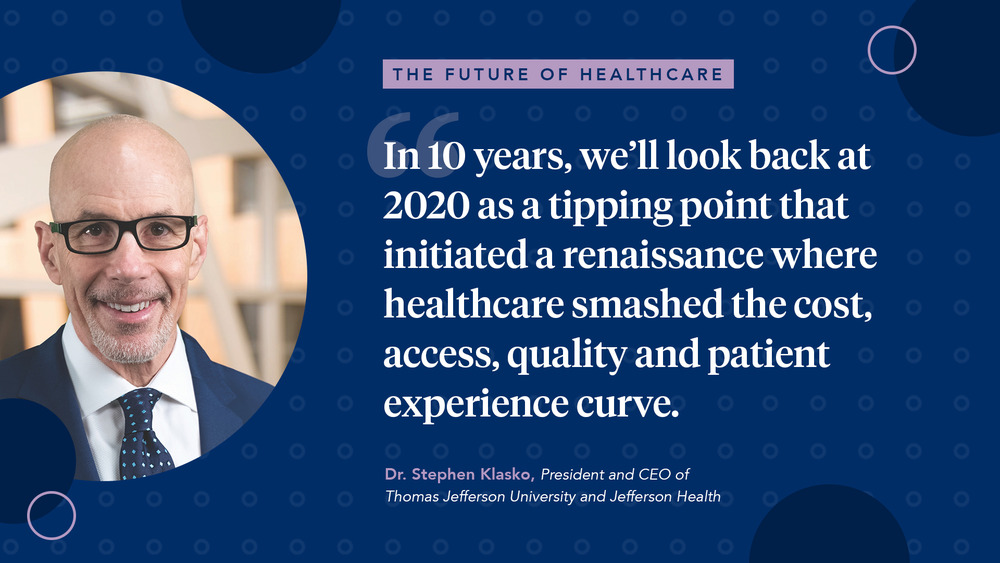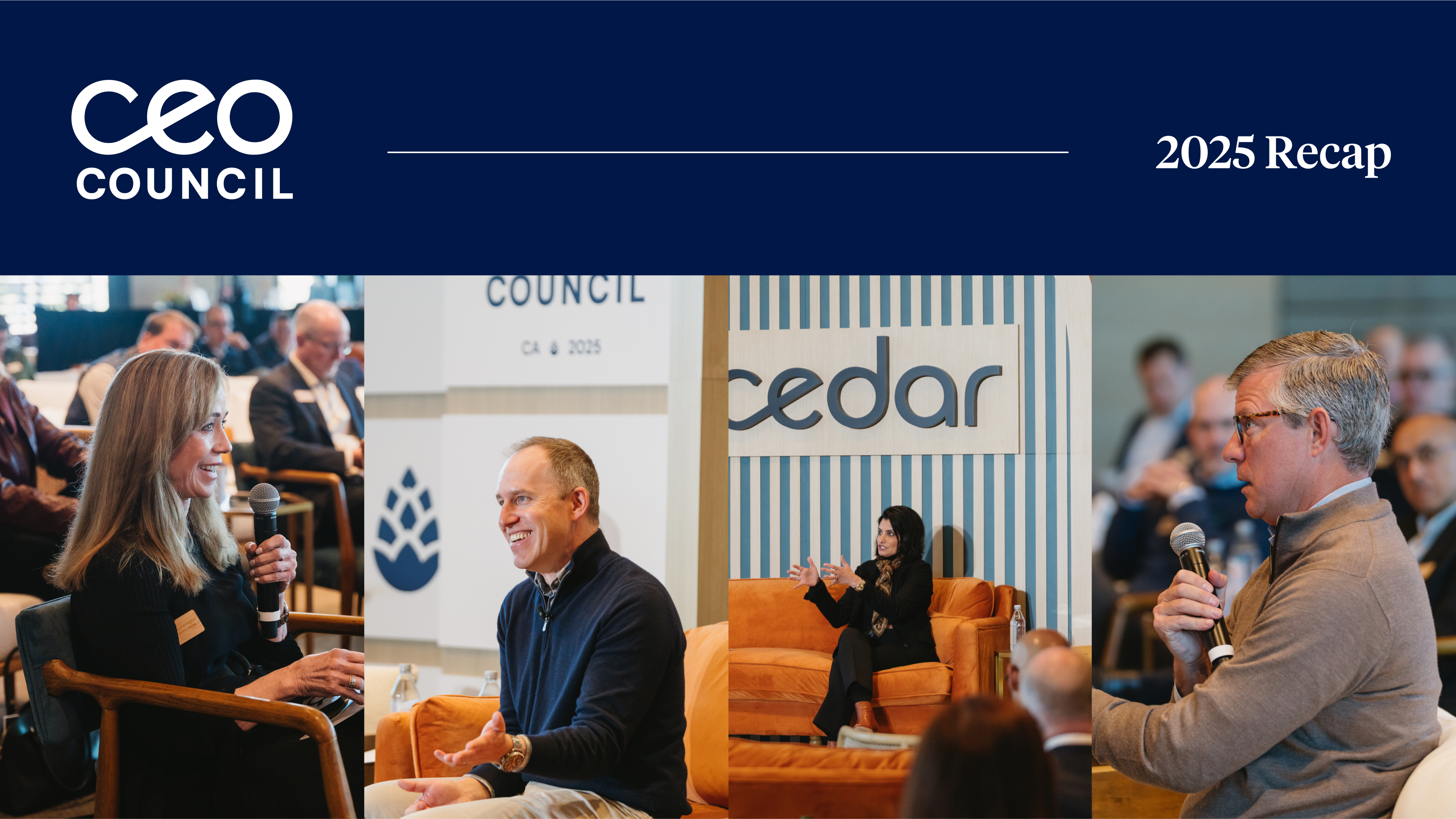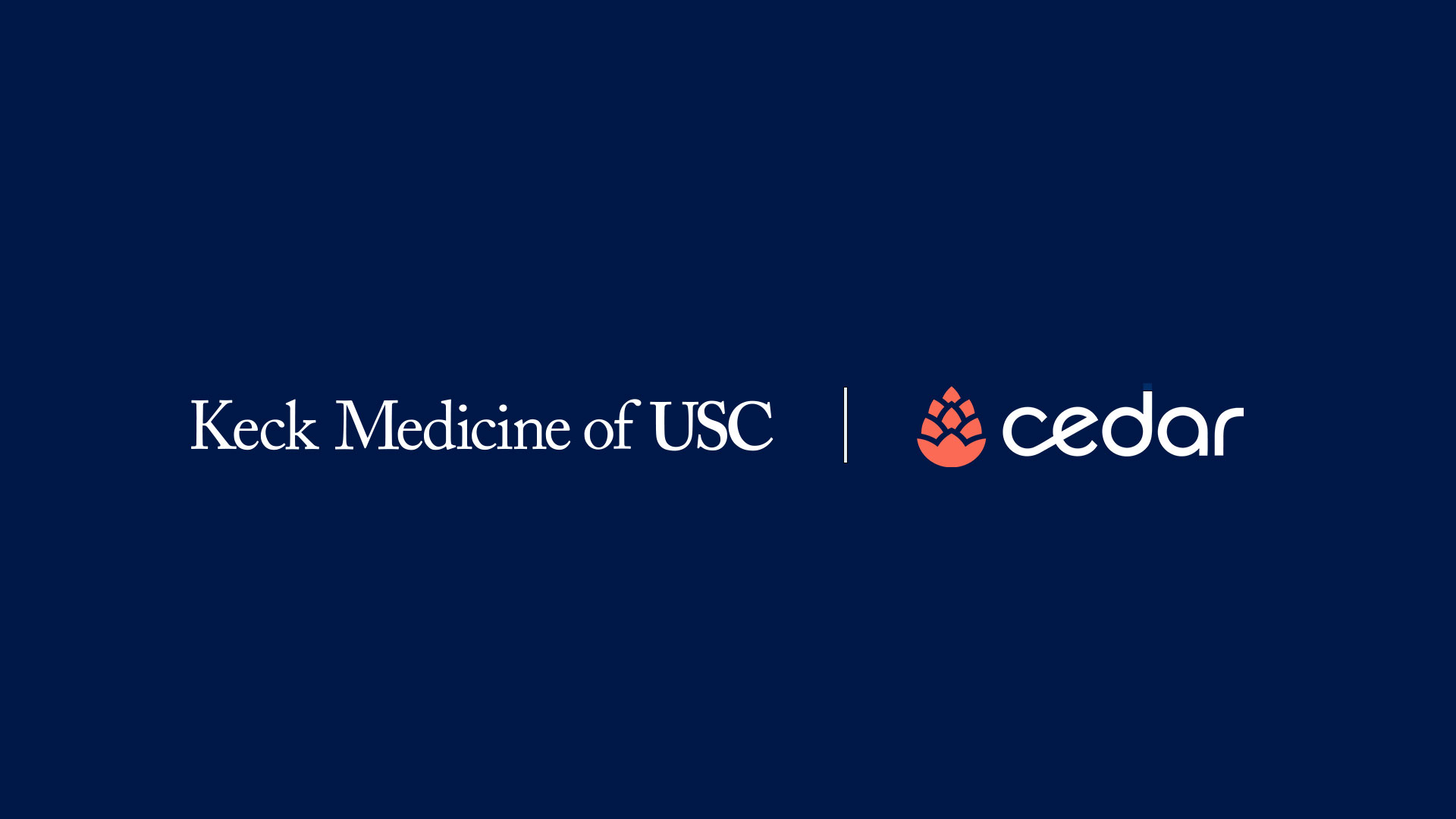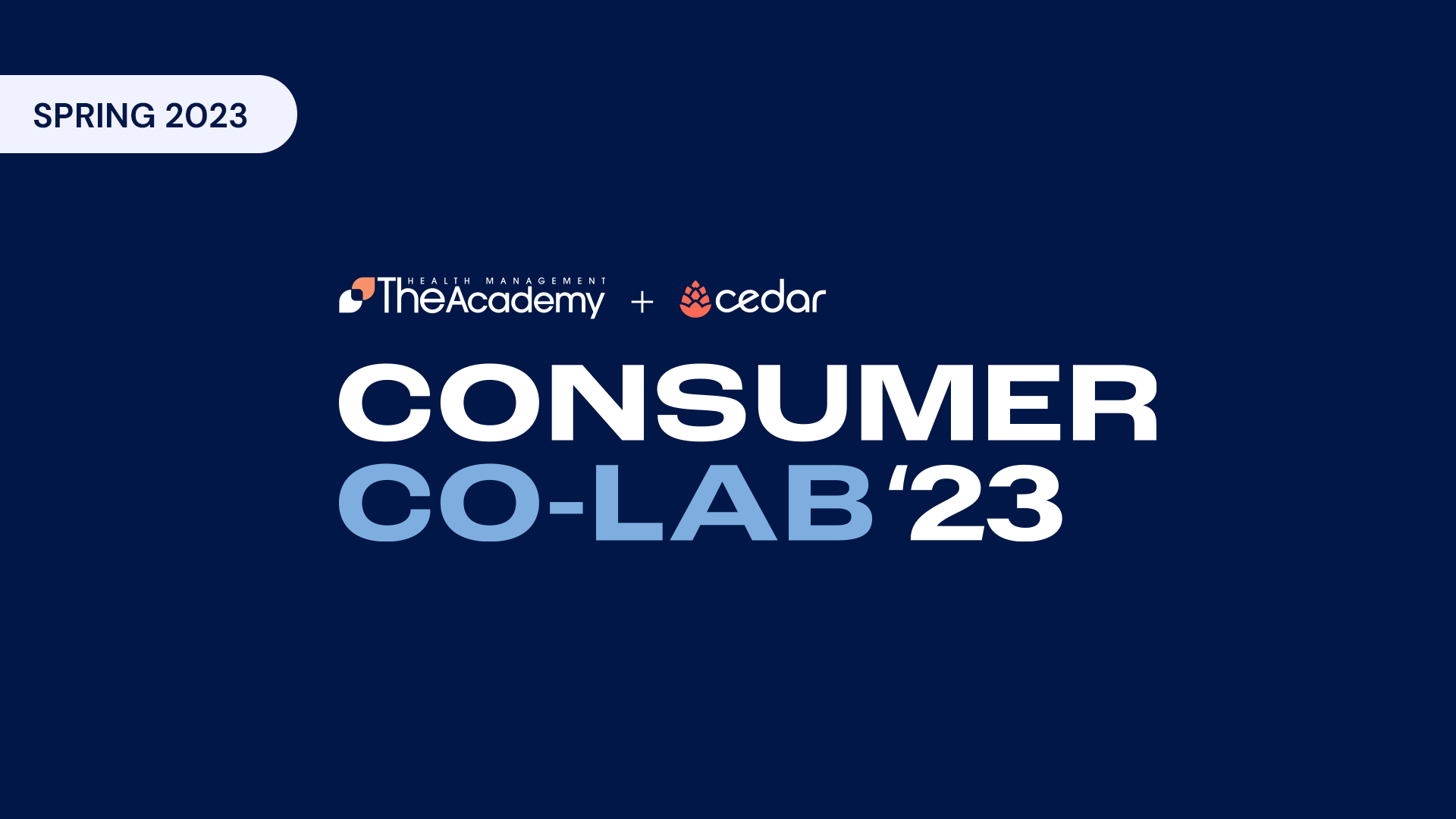In the age of COVID-19, health systems must improve bi-directional engagement and empower patients via digital touchpoints across the care continuum.
This imperative is top of mind for President and CEO of Philadelphia-based Thomas Jefferson University and Jefferson Health Dr. Stephen Klasko, who joined us for a discussion about advocating for a combination of health care, higher education transformation and pioneering technology to build health assurance as we emerge from COVID-19.
Throughout the conversation, topics ranged from understanding how technology is improving patient experience and outcomes, upleveling patient engagement across the care journey and Dr. Klasko’s experience leading one of the nation’s fastest growing academic health institutions.
Since embarking on his career in healthcare as a medical student in the 1970’s, two questions have stuck in the back of Dr. Klasko’s mind, even now as CEO of a 14-hospital health system:
- Can we get physicians to embrace change and be optimistic about the future?
- Can we do anything to reduce health inequities?
For decades the answer seemed to be “no,” or at best, elusive. Then COVID-19 hit. Dr. Klasko believes the pandemic has ushered in a period of lasting accelerated change, and predicts that in 10 years, we’ll look back at 2020 as a tipping point that initiated a renaissance where healthcare smashed the cost, access, quality and patient experience curve through a series of disruptive events and creative partnerships.
In just three months this year, Philadelphia’s Jefferson Health logged 100,000 telehealth visits – the same number the system logged in the entire five-year period between 2015 and 2020.
According to Dr. Klasko this is emblematic of the beginning of an evolution in which healthcare rapidly evolves from a “broken fragmented expensive inequitable sick care system” to a health assurance system where most care happens at home.
We selected a few highlights of our interview with Dr. Klasko below. To get all the insights from this healthcare administrator, OB-GYN doctor, MBA, marathon runner, pilot and all-around Renaissance man, click here to watch the full interview.
On changing consumer expectations and Jefferson’s digital patient engagement tools that enable “healthcare with no address”:
Dr. Klasko shared how Jefferson had enabled family members to remotely participate in a patient’s care even from afar. “We started something where you sign up when you come in [to Jefferson Health], and say you have a son in Dallas and a son in Miami. We send them HIPAA compliant software and they can participate in rounds.
It was fascinating because Forbes did an article. On one hand I felt really proud. On the other hand, I said we could have done that three years ago with FaceTime or five years ago with Skype…but patients accepted that lousy sort of consumer care and we didn’t care enough.
We want banking to be our model. When I was at Davos last year, the CEO of Bank of America said that 30 years ago the two sectors that escaped the consumer revolution were banking and healthcare. And then he stopped and said, ‘Now you’re alone.’ If we had a pandemic 30 years ago, we would have been talking about you having to go to the bank every other week to deposit your check because of social distancing.
But think about that. We don’t get up in the morning and say ‘I have to go to a telebank.’ It’s just that banking moved from 90% in the bank to 90% at home. What’s interesting is it didn’t start because Wells Fargo and Bank of America said ‘I want to provide better care.’ It started because people got tired of banking hours [that were] from nine to four.”
Watch Dr. Klasko talk about the role of technology at Jefferson at 16:38.
On choosing the right telehealth vendor and promoting telehealth before the pandemic:
“We had used a certain vendor [that told us] ‘this is how we do telehealth and some doctor from Detroit will talk to your patients.’ We said that’s not what we want. We ended up partnering with Teladoc, [since] they were willing to be the ‘Intel Inside’ for [our self-owned telehealth product] JeffConnect®.
By the way, that took a lot of work [to implement telehealth] with an academic faculty. I almost had a revolution because I went to every one of my chairs in 2013 and said, ‘In order for you to get your incentives, you have to get at least 80% of your faculty to sign up for and do at least one telehealth visit a month.’ It was like I was teaching Satanism at that point!
17 of the 18 chairs did it, and then of course they loved it. So I think some of this is starting to change that culture, partnering with companies like Cedar and then having the health system feel pride because they owned it.”
Check out Dr. Klasko’s insights at 19:55.
On the disparity in healthcare innovation between medical technology and administration:
“One of my colleagues, Dr. Freda Lewis-Hall, said, ‘We have Star Wars technology for individual patients and a Fred Flintstone healthcare delivery system.’
In some respects, and this is going to sound weird, I blame the consumers. I’ve said how people have way too much respect for the American healthcare system. And as you can imagine, I got killed by my doctors [laughter]. But if you have an appointment for 8:00 and your doctor shows up at 8:45, 90% of the time the patient will go, ‘It’s OK, you must have had an emergency.’ And that’s true about 12% of the time. The other time the doctor was at breakfast. But [the doctor] knows they’ll be OK.
There’s no other industry where that’s the case. And once we break through that ‘Wizard of Oz’ veil, there’s no reason healthcare can’t be consumer driven. It’s not like being the best doctor means that you are not consumer driven. You can be both.
In any community there are a lot of good doctors. You shouldn’t accept bad consumer care. The winners [in healthcare] are going to be those that stop going after patients and start going after people. 95% of people in Philadelphia don’t wake up in the morning and say, ‘I’m a patient.’ They say, ‘I’m a person who would like to have me and my family thrive without health getting in the way. I might have a chronic condition, or I might have surgery next week but I don’t view myself as a patient.’
If I can start to consumer segment like every other industry does and go after those people while they’re people and have them have our app at home, at the point that they become a patient, they’re not going to go up and down the Schuylkill Expressway and say, ‘Oh I think Penn has a cooler billboard than Jefferson.’ They’re going to say, ‘Jefferson’s been there while I’m healthy, I’m going to go there.’
To me, that’s the new secret sauce.
How you relate to people as a healthcare provider, we’ve never thought of it. Most hospitals have a marketing team that’s my age that’s used to doing hospital marketing: ‘How many billboards are we going to have? How many ads on TV? Alright we’re done.’ I think that’s a thing that has to change.”
Watch Dr. Klasko’s full answer at 22:38.
On health inequity in Philadelphia and how innovation is helping:
“Philadelphia has five or six academic medical centers and we’re pretty proud of ourselves. At the same time, we have the largest discrepancy in life expectancy by zip code of any city in the country. And the traditional thing has been physicians saying, ‘Well, if they come to my hospital, they get great care.’ That’s not the point. We’ve known academically that 80% of dollars are spent on what will change 20% of healthcare. So the challenge for those embracing the Fourth Industrial Revolution is how we don’t make the same mistakes.
But the first thing we have to do is recognize that whether it’s AI, robotics, genomics, drones, they can’t just make the wealthy healthier. And we have to literally figure out, from the beginning how we start to reduce the gaps around food, housing, education and those kinds of things.
[We’re working] to create a center for responsible innovation. If we knew that the internal combustion engine during the industrial revolution was going to affect the environment, we might have made some changes. If we knew that the social media revolution wasn’t just […] so I can see my grandkids on Facebook – that it could affect elections or spew hate – we might have put some things in at the beginning.
So we know this Fourth Industrial Revolution is going to make some major changes. So before we talk about what it can do positively, we have to make sure the negative doesn’t happen.
We have to start to look at real creative partnerships that can get out to the community. Let’s take food deserts. I’m really excited about where technology can go with that. One of the things that we talked about at the World Economic Forum last year was doing pilots in places like Philadelphia. Everything is barcoded now. So what if you went to families that are on food assistance and said, ‘We’ll give you 50% more food assistance if you’re willing to use that money just for healthy food for your family.’
And you can do the math on what that would do for childhood obesity or whatever and then drone deliver that food. In essence, that would get rid of food deserts.”
Hear Dr. Klasko’s thoughts at 28:48.
If you’d like to be notified of future Cedar events, click here to join the mailing list.



